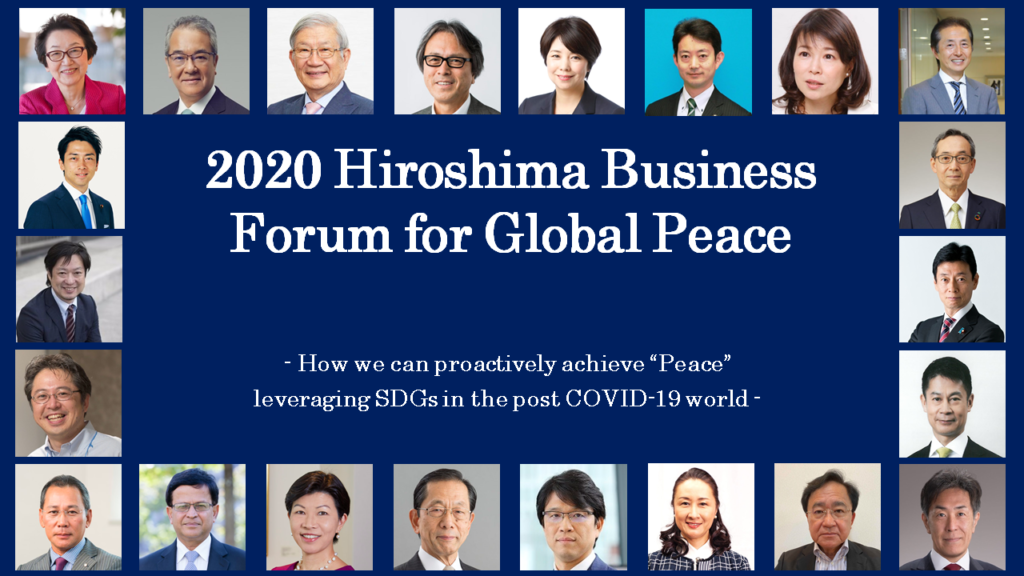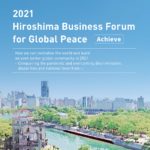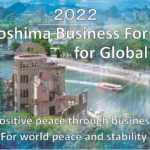2020 Hiroshima Business Forum for Global Peace -How we can proactively achieve “Peace” leveraging SDGs in the post COVID-19 world-

Keynote Speech
Management in Harmony with the Global Environment
KOBAYASHI Yoshimitsu
Mitsubishi Chemical Holdings Corporation, Director of the Board, Chairperson
- Science is literally a double-edged sword. While it has provided positive direction, it can also guide the way to unhappiness. As we move forward in the 21st century, the major theme will be how to lead humanity in the right direction.
- In Japan, it has been called the “boiling frog” condition. In order to make the carefree frog jump out of boiling water, you had to throw in its natural enemy, the snake, but the snake was COVID-19. With COVID-19, it became clear what would be highly accelerated and what would return to its old ways. In Japan, what was to accelerate was digitalization. A strong spirit is necessary to help bloom the digital renaissance.
- On the other hand, a pandemic is not limited to just this time. At the same time as the developments in bioscience, it made us realize that a response to what caused the Earth’s climate change was necessary.
- A company’s value is based on the aggregation of every vector of the three axes: earnings, innovation, sustainability. The issue is how to maintain balance of the three.
- There are results showing that there is a linear correlation between companies that are profitable and those organizations that are concerned with ESG and SDGs.
- How are we supposed to respond to the paradigm shift from before COVID-19 to after COVID-19? For absurdities such as the nuclear bomb, the bonds of humanity or a collective bond such as altruism or a philosophy is important but in reality, this is not a simple matter. Instead, we run the opposite. What becomes important for the world moving forward is how seriously we commit to switching over to “non” reasoning that has gone beyond reasoning but based in technology.
Session1
Global economy and disparity issues during-COVID-19/ post-COVID-19
| MITACHI Takashi | Senior Advisor, The Boston Consulting Group 〔Moderator〕 |
| ICHIKAWA Akira | Vice Chairman, Japan Association of Corporate Executives (Keizai Doyukai)/ Chairman of the Board and Representative Director, Sumitomo Forestry Co., Ltd. |
| Kathy MATSUI | Vice Chair, Goldman Sachs Japan Co., Ltd. |
| MIZUNO Hiromichi | Member of the board of PRI (Principles for Responsible Investment) Association/ Special Advisor to Ministry of Economy, Trade and Industry (METI)/ External board member Tesla, Inc. |
| NISHIMURA Yasutoshi | Minister of State for Economic and Fiscal Policy/ Minister in charge Economic Revitalization/ Minister in charge of the Trans-Pacific Partnership/ Minister in charge of Social Security Reform/ Minister in charge of Novel Coronavirus Disease Control |
Key Remarks
- In response to the various issues of environmental degradation, etc. that we will face in the future, build a society that is more inclusive, more resilient by involving all the stakeholders.
- Income disparity is one of the major themes for an ESG investor.
- If we all talk about SDGs together and can focus our intentions on truly realizing a world view that advocates SDGs, that will become the base case for investments and the management approach will naturally change as well.
- It is the individual consumer and management executives that initiate a fundamental change. We are hopeful for proactive statements from management executives.
- For a society that is shaping peace, what is sustainable development and how does one go about accomplishing this? In particular, it is necessary to examine closely what responsibilities the company must fulfill.
- An altruistic spirit is necessary for the region and society. One such initiative that is pushing this forward is responsible investments in the financial industry.
- As a company, are there evaluations that can deal with variety and diversity? There is a need to review the current evaluation structure.
- To make investors invest in good companies, and for investments to go to companies that undertake global initiatives and SDG-related initiatives, a discerning consumer becomes vital.
- To build a new normal that is different from our ways thus far, for the various industries and business categories, we must concentrate our wisdom and ask for everyone’s support to make Japan a world leader in providing a global model.
- In any country and any society, there are vulnerable people that need to be considered. At the same time, there are some vulnerable people who require encouragement for change and support. We need to make sure there are no mistakes and make progress on things that require progress. Otherwise, it may seem like you are protecting the peace but then it turns out that risk has increased.
- The keyword is disparity. To fight this, the concrete theory is inclusiveness, in its broad sense of the word.
- Japan doing what it needs to do or working to encourage it, will maintain world peace and help to reduce the risk factors.
Session2
Threats to peace from excessive industrialization/urbanization and climate changes, particularly with pandemic impact (during/post COVID-19)
| KOIZUMI Shinjiro | Minister of Environment(Video Message) |
| TAKEUCHI Sumiko | Senior Fellow and Member of Board of Directors, International Environment and Economy Institute 〔Moderator〕 |
| ARIMA Yoshiyuki | Representative Japan, World Bank Treasury |
| SASAKI Shigeki | Chairman, Hiroshima Association of Corporate Executives / President, Otafuku Holdings Co., Ltd. |
| SUMI Shuzo | Senior Executive Advisor , Tokio Marine & Nichido Fire Insurance Co., Ltd. |
Key Remarks
Video Message
- Creating an economy and society without considering the environment cannot make people’s stable and happy lives sustainable.
- No matter the circumstances, even during periods of calm, we must continue to think about that which is the most important, peace. In the face of the two crises of COVID-19 and climate change, I hope the new values, and new ideas from this forum leads to new actions that each individual can start to work on today.
Discussion
- After COVID-19, economic disparity will become the most serious issue. With the progress in digitalization, we will begin to see changes in the way we work, away from urbanization and centralization as a way to increase productivity. On the other hand, the safety net for those who lose their jobs will become a major societal challenge.
- Moving from shareholders come first to prioritizing stakeholders. Management will need to prove that rather than the pursuit of short–term profits, a management style that considers long-term perspectives such as social contribution will further improve performance.
- Over the next 10 years, contribute to the creation of rules, such as international cooperation in the economic world while maintaining the balance with politics, discuss privacy and public interests during times of emergencies, consider the state of distribution policies and safety nets, and growth amidst enormous government spending and distribution strategy.
- The World Bank’s financing has moved from infrastructure to education projects and projects that improve living standards. On the other hand, in a situation where everyone is struggling, how can we resolve the problem as a whole world?
- Many investors are starting to make investment decisions based on ESG factors, in other words, taking into consideration how the funds will be used in society as part of the returns.
- What will be key moving forward is how to simultaneously use private funds and public funds.
- Evaluations will consider each item one by one to determine if it is beneficial for the stakeholder from a long-term perspective.
- For a business that was based on ideals and vision, how SDG ideas can be incorporated.
- One of the answers to Hiroshima’s miraculous recovery is “just the right sense of scale”. Hiroshima’s strength is the ability to come together as one and plan for total optimization.
- The way of society is changing from an era which plans for optimization through centralization, to one of decentralization. Furthermore, people’s awareness has also diversified. They might not have all the answers, but awareness is changing, and various initiatives are being borne. What is most important is for people to continue discussing.
Session3
The role of local governments in global society – Building peace through education and diplomacy (during/post COVID-19)
| SUEMATSU Minako | Chairperson, Publisher and President, The Japan Times, Ltd 〔Moderator〕 |
| HIRAKAWA Rie | Superintendent of Hiroshima Prefectural Board of Education |
| IOKIBE Makoto | Chancellor, Public University Corporation of the University of Hyogo |
| KUMAGAI Toshihito | Mayor of Chiba |
| Nikhil SETH | Assistant Secretary-General, United Nations / Executive Director, UNITAR |
Key Remarks
- For SDGs that reach out to the most vulnerable people, the local government is essential. In order for us to change, we must start at the local level.
- As citizens of Earth, fostering a sense of responsibility from one’s early years is what builds long-lasting peace.
- Always conducting visible diplomacy at the local government level will contribute to global peace and international exchange.
- Optimize the country’s major policies at the local level. Doing what you are told to do does not necessarily lead to the policies of the whole country being realized in its best form.
- One issue is assertive participation in a school community. Even if we are to discuss global issues, this kind of experience is important.
- By proactively participating in the regional community, it will nurture personnel that is able to resolve problems for the regional community and even globally.
- With regards to decision making, while the weight of major nations is significant, whether the regional government can coordinate and education can exert influence is not simple and is a situation about which we should all be extremely concerned.
- The problem of economic disparity is extremely large. It cannot be stopped if there is ignorance and prejudice regarding COVID-19 coupled with social disparity. And society’s ability to respond. In this sense, society’s fairness is important.
- Everyone has the right to live with equality, and human security is for everyone. What supports this is the duty of governmental authority and based on this thinking, it will not be improved without regaining economic activities that bring back equality.
- The current challenge in education in Japan is the lack of diversity. Amidst a move towards a civil society, schools and the responsibilities of teachers need to transform from “teaching” to “supporting learning”.
- The role of schools is for everyone to practice speaking with each other democratically. If the combined efforts of the society, as well as the regional community and economic industry in its various forms, could raise children together, would it not lead to peace?
- Even if there are many changes to the world, having to deal with what is happening right in front of them is the basic municipality. If the leaders of the regional government make decisions that are appropriate for the region, the citizens can feel even safer in leading lives suited to their lifestyle. Japan does not equal Tokyo.
- This session today allowed me to realize once again that the pride of municipal diplomacy does not just maintain peace but is also truly useful in the prevention of dispute and violence.
Special Session
”Human Security” and “Peace x Business x SDGs” during-COVID-19/ post-COVID-19
| JIMBO Ken | Professor, Faculty of Policy Management, Keio University 〔Moderator〕 |
| ATAKA Kazuto | Professor, Faculty of Environment and Information Studies, Keio University / Chief Strategy Officer, Yahoo Japan Corporation, JP |
| KAWAGUCHI Yoriko | Visiting Professor, Musashino University |
| TAKASHIMA Makoto | President and CEO, Sumitomo Mitsui Banking Corporation |
| YUZAKI Hidehiko | Governor, Hiroshima Prefecture |
Key Remarks
- All over the world, there is a strong trend towards sparsity rather than high density, contactless rather than contact, and a shift from a society where people move rather than goods, to a society where goods move rather than people.
- Now is the time to think about what kind of future we want to leave behind and what kind of future is worthy of leaving behind. We need to think about what is peace, as a set with a world without plague and hunger. That is the cooperation of Earth and human goodness. Shouldn’t peace be redefined from this perspective? By creating a new definition of peace and through restoration and recovery, we will further prosper, making this a revolutionary turning point from a military-industrial complex to a peace-industrial complex.
- As we look towards 100 years since the end of World War II, the next 25 years will be an era where civilians and businesspeople will call into question the fact that peace is no longer just a political issue.
- To what extent civilians and businesspeople can, right now, independently and actively take part in the process of change, is an extremely large challenge/theme. To that end, it is vital that a partnership is forged with someone who has vision and that action is taken together.
- When considering who will deal with weakening states and growing poverty and environmental challenges, what resulted was human security. The bearer of this responsibility is not just the country or military but also corporations, NGOs, regular citizens, and the local governments. In particular, with national finances strapped, everyone must bear the burden of supporting the public.
- It is important for like-minded people and countries to gather and make various moves. In the international community, what is reassuring is that the EU created a recovery fund .
- Maybe there is renewed awareness of the necessity for citizens to take greater control over their country. This could become the impetus to create a new system.
- Awareness regarding various global problems, including those regarding nuclear weapons has changed and has now become an individual problem. The current system can no longer handle problems of interest, including the economy, which until now had been resolved simply between one country and another.
- As we enter an era where the human brain and body can be externalized, we have come face to face with this current situation. How do we independently control this while sharing ethics and value? Could we continue to develop in the same way by thinking what is best for Earth and total optimization so as to overcome obstacles?
- Humanity’s history is a history of controlling the environment. It is now time to reconsider whether this premise should be accepted. At the same time, despite shared challenges around the world, international cooperation has not come about, and we keep seeing countries once again return to their own framework. Why this is and how we evaluate today’s historical position are themes we must think about.
- We would like to continue reinforcing the identity of disseminating from Hiroshima to the world. We hope we can look back in history and see that today’s discussions regarding a new definition for peace and way of peace are realized with Hiroshima as its starting point.
Concluding Panel Discussion
Announcement of the “2020 Hiroshima Declaration”
| KAJI Yoshimitsu | Chairman, Cinnamon AI/ Professor, GLOBIS Graduate School of Management/ Kamakura City Government Advisor for SDGs and Smart City |
| MITACHI Takashi | Senior Advisor, The Boston Consulting Group |
| YUZAKI Hidehiko | Governor, Hiroshima Prefecture |
| ● The speakers and participants reaffirmed the importance of cooperation between economy and peace, considered what can be done, not just by Japan but by the world, and because it was in Hiroshima, keeping the 100th anniversary of the atomic bomb and the end of WWII on the horizon, announced the “2020 Hiroshima Declaration”, in order to realize “positive peace,” which is the premise of a democratic and free business. |
2020 Hiroshima Business Forum for Global Peace 2020 Hiroshima Declaration
The Hiroshima Business Forum for Global Peace has been held with the aim to create a truly peaceful and sustainable global society. To this end, the event has served as a venue for sharing insights on the importance of global peace as a business platform, reviewing the roles of companies, NGOs, and other entities, and discussing ways to connect business with contribution to peace from multiple angles.
The year 2020 marks the 75th anniversary of the atomic bombing and the end of World War II. It also marks the beginning of the fight against COVID-19 and the era of living with the disease. In light of the above, and in order to achieve “positive peace,” which involves eliminating peace-threatening issues, we have gained a renewed awareness of the importance of the link between economy and peace, and have held discussions to clarify the roles that businesspeople should play and what courses of action should be taken.
Peace in the broad sense, including conservation of the natural environment, is a prerequisite for all forms of democratic, free business. Once peace and security are lost, business loses its foundation. But peace is not a given: we must actively contribute to peace and create it ourselves.
Business can contribute to tackling social challenges and creating social stability, through activities for achieving the SDGs, for example, and, in turn, contribute to the development of positive peace. Such activities do not inhibit profits, since a cycle is created whereby social peace leads to improvement of the business environment and generation of further business opportunities.
Seventy-five years have passed since Hiroshima was all but annihilated by an atomic attack. We, the participants of the 2020 Hiroshima Business Forum for Global Peace, have gained a renewed awareness of the importance of the link between economy and peace. From the unique standpoint of Hiroshima, in determination to contribute not only on a national but also on an international scale, and with our eyes on the 100th anniversary of the atomic bombing and the end of World War II, we declare our intention to take renewed action geared toward achieving positive peace, the prerequisite for all forms of democratic, free business.
Our Specific Actions
By engaging in the SDGs and actively contributing to the creation of positive peace through business activity, we will achieve a deeper level of perpetual peace among humanity based upon both material and psychological fulfillment.
From a perspective of “Global economy and disparity issues” based on session1
● Capitalism can improve the welfare of people around the world through robust economic activity. While leveraging such strengths, we will address capitalism’s potential weaknesses by incorporating the SDGs—reduction of inequalities, conservation of the natural environment, etc.—into business management and contribute to achieving positive peace. In recognition that diversity enhances social and economic resilience, we will strive to create an inclusive society and economy.
● Aiming to achieve positive peace, we will strive to ensure that SDG- and ESG-oriented companies are recognized in financial and investment activities that support economic entities, and that such companies can be assessed appropriately by financial institutions and investors. In view of the importance and significant influence of customers in changing company behavior, we will strive to further communicate with consumers.
● We will strive to enable SDG-oriented companies, financial institutions, and investors to fulfill their objectives in the establishment of domestic and foreign rules and regulations on economic and trade activities, and contribute to achieving positive peace.
From a perspective of “Threats to peace from excessive industrialization/urbanization and climate changes, particularly with pandemic impact” based on session2
● From the perspective of tackling COVID-19, businesspeople will bear in mind that discussion is taking place about the need for decentralization instead of conventional modes of centralization such as industrialization and urbanization, and will strive to engage in forms of business management and financial activity that focus on appropriate ways to promote social transformation while ensuring peace. Businesspeople will reaffirm the fact that communication between stakeholders is essential in order to address ever increasingly complex issues and achieve total optimization, and that appropriateness of scale (e.g. the scale of Hiroshima City and Hiroshima Prefecture in the process of reconstruction after the atomic attack) is an important factor in achieving this.
● In the face of the increase in damage caused by natural disasters in recent years, we will keep in mind that appropriate measures against climate change contribute to strengthening of the foundation for economic activity. To this end, it will be essential to capitalize on large-scale innovation as well as new financial functions, both public and private.
● Some SDGs have a trade-off relationship, and the goals are interrelated. Businesspeople will, on an individual company level, aim to achieve these goals, while striving to create a win-win situation for the whole of society. We will organize the various initiatives taken at the individual level as part of the SDG movement, raise further awareness of the issues, and promote integration of the SDGs into management activity.
From a perspective of “The role of local governments in global society” based on session3
● In order to maintain peace, which is a prerequisite for economic activity, and achieve the SDGs, it is essential to develop globally-oriented businesspeople capable of contributing to peace. More specifically, we should incorporate perspectives such as scientific literacy, involvement in the local community, eradication of prejudice, and alleviation of social inequality. We intend to support public and private education systems designed to develop such individuals.
● Diplomacy between local governments, which is closely related to civil society and the community, serves as a supplement to diplomacy between countries. Sister city relationships, among other forms of relationship-building unique to local governments, play an important role in the promotion of sustainable peace. Local governments will stay fully aware of this role and contribute to the advancement of peace.
● As inequality continues to rise globally, we will utilize digital/online means in order to enhance educational effectiveness.
From a perspective of “Human Security” based on special session
● It used to be the responsibility of the state and its leaders to maintain security. But times have changed, and today it has become important for each individual to play a part in ensuring human security. Companies, local governments, NPOs, NGOs, and individuals must participate in the establishment of positive peace.
● The COVID-19 pandemic has brought preexisting issues, along with the change trends associated with them, to the fore at an accelerating rate. Our responses to unknown risks to humanity may lead to greater risks to peace. Recognizing this possibility, we will actively respond to such risks. When taking action, we will share our ethics and values with other entities and strive to achieve total optimization for all humanity.
August 8 , 2020
All participants of 2020Hiroshima Business Forum for Global Peace
-Previous Conferences-
2016 World Business Conference for World Peace(October, 2016)
《Conference Overview》
○ Featuring Prof. Kotler, this was the world’s first meeting for marketing peace.
○ The event drew approximately 300 participants, including world-leading top executives, researchers, social entrepreneurs, and representatives of international NGOs from both home and abroad. The event was also attended by WEF young leaders.
○ We discussed the possibility of establishing peace through marketing.
《Three Recommendations from Prof. Philip Kotler》
Peace-making through the points below:
1. Reducing the amount of weapons, including nuclear weapons
2. Reducing the amount of hatred
3. Increasing the amount of love
《Joint Communiqué》
Proposals for developing a sustainable platform for peace dialogue
1. The World Business Conference for World Peace should continue to be held in the future.
2. A Track2 (businesses and NGOs/NPOs) Community for peace dialogue based in Hiroshima should be developed and maintained through the following means:
(1) Creation of a secretariat and a foundation with a mission to maintain and support the Track2 Community
(2) Creation of a “Peace Marketing” Laboratory
(3) Reinforcement of Hiroshima’s information outreach and dissemination capabilities as a Global Peace Hub
3. Hiroshima’s research capabilities for peace should be strengthened and build upon.
| Session1 | Campaigns to Abolish Inhumane Weapons |
| Session2 | Communications Design for Peace Campaigns |
| Session3 | Marketing for Non-profit Organizations that Contribute to Peace |
| Session4 | The Role of Soft Power in Marketing Peace |
| Session5 | Discussion Panel with Young Global Leaders of the World Economic Forum |
| Session6 | New Enterprise Value Created by Contributing to Peace(BOP・CSV) |
| Session7 | Branding “Hiroshima” as Global Peace Hub |
2018 World Business Conference for World Peace(November, 2018)
1 Memorandum signed with the Global Positive Forum
In order to contribute to realization of peaceful international society without nuclear weapons, a memorandum was signed with the Global Positive Forum, over which Mr. Jacques Attali presides.
<Objectives> To facilitate more sustainable contributions to the realization of a peaceful international society through mutual cooperation.
<Agreement> To cooperate toward joint organization of the Positive Economy Forum and the World Business Conference for World Peace in Hiroshima in 2019 and thereafter.
2 Formation of a community and platform through which international peace will be promoted
Mr. Attali underscored the importance of Hiroshima, sending out message by connecting peace with positive actions. He also suggested that there would be a need to develop infrastructure for peace in such areas as the economy, culture and education. With some speakers declaring their intention to build a community for peace, the Conference helped to lay a foundation for the community and platform creation In the future.
3 Promotion of the SDGs, BOP and CSR businesses
Through organization of the SDGs Business Contest and the compilation of SDGs case studies by Hiroshima-based businesses, the basis of a system for promoting the SDGs business in collaboration with NPOs, universities and private business were formed.
4 Collaboration between the business sector and NPOs/NGOs, aligned with government
At various sessions, proposal were made on how such collaborations should /could be made.
| Startup Program | Realizing Peace through the Creation of SDGs, BOP and CSR Business |
| Session1 | The Security Risks of Climate Change and Environmental Innovations as Countermeasures |
| Session2 | Securing Peace in an Increasingly Unstable Digitized World |
| Session3 | Commitment to Education for Lasting Peace in the New Era |
| Session4 | Realizing Peace through the Social Impact of Art |
| Session5 | Achieving Peace through the Power of Sports |
| Session6 | Altruistic Capitalism and a New Path to Peace |
2019 World Business Conference for World Peace(October, 2019)
1 Even closer tie with the Global Positive Forum
We organized the conference jointly with the Global Positive Forum, with which we had concluded a memorandum last year, leading us to disseminate messages more powerfully to the world and influence the world more greatly. Toward the joint organization of the next year’s conference, we have agreed to proceed with preparations to draw a wider variety of participants and make the event even more fulfilling.
2 Contribution to the fulfillment of the SDGs
Setting the SDGs, an intersection point of peace and business, as a conference subtheme, we discussed various topics, such as the definition of peace today, the relationship between the SDGs and peace, and new indexes for realizing a sustainable society and handing down an even better world to the next generation. This discussion has enabled us to form the basis on which SDG 16 “Peace, Justice and Strong Institutions” is reinterpreted, Hiroshima-style.
3 Increase in the number of supporters toward realizing peace
We discussed peace with representatives from a wide variety of fields, including not only business, but also from culture, sports, disaster damage reduction, and emergency aid. We gained support from these representatives to make continuous contributions to realizing world peace in their respective positions. This achievement made in 2020 served as the first step toward a dramatic increase in the number of those who would support a wide variety of efforts to accomplish peace.
4 Dissemination of messages by youth as the next-generation key players
Together with young people, who will underpin the next generation, we discussed what the world should be in 2045, the 100th anniversary of the atomic bombings, and what we can do now. The discussion was followed by their statement on the importance of establishing a peace platform and increasing the number of producers of peace, and their determination toward the next year’s event. This served as the starting point for young people themselves to form a community for engaging in next year’s event.
5 Promotion of SDGs business
We organized an SDGs business contest and released SDGs Select Booklet to spread the concept of the SDGs among companies in Hiroshima. This served as an opportunity to consider establishing a scheme to promote SDGs business through cooperation among NPOs, universities, companies, etc.
| Special Session | Growth, Index and Peace |
| Session1 | Cultural Exchange Programs and Peace |
| Session2 | Sustaining Governance through Infosphere Security |
| Session3 | Contributions to Peace through Disaster Prevention, Emergency Assistance and Global Health in Asia |
| Session4 | Realization of Peace through Global Business Strategy |
| SDGs Business Contest | Hiroshima Peace Startup Award |
Tags associated with this article








